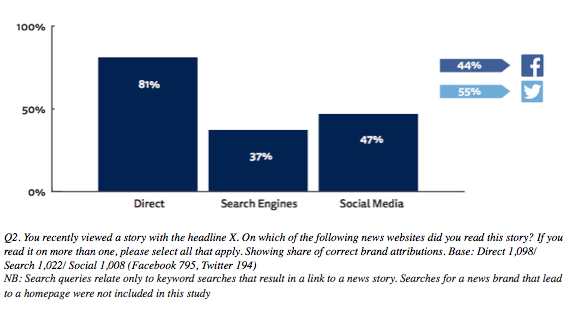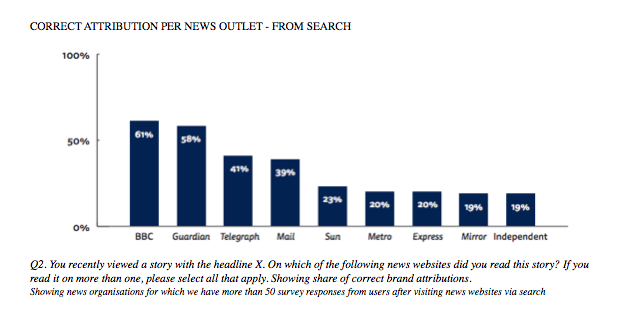News brands are remembered less than half the time, when accessed via distributed platforms such as social media and search, according to new research from the Reuters Institute for the Study of Journalism (RISJ), published today (19 July).
By contrast, most people were likely to remember the platform through which the news content was found (e.g Facebook, Twitter or Google).
These findings, from "‘I saw the news on Facebook’: Brand attribution when accessing news from distributed environments", reinforce the idea that platforms are getting more credit than publishers for the news content they distribute.
Despite this, the study, authored by Antonis Kalogeropoulos and Nic Newman, and also shows that some brands like the BBC, the Guardian and BuzzFeed are able to achieve much higher levels of correct attribution through strong branding or distinctive content – even when accessed via distributed platforms.
Working with polling agency YouGov, RISJ tracked the actual news consumption of a representative sample of thousands of UK internet users (desktop only) and, within 48 hours, served a survey to a proportion of these users to see what they could remember about the stories and brands they had used.
Less than half could remember the name of the news brand for a particular story when coming from search (37 per cent) or social media (47 per cent). This compares with a correct attribution rate of 81 per cent for users who arrived directly from another page on a specific news website.
By contrast, between half and two-thirds could remember the path through which they found the news story (social media 67 per cent, search engines 57 per cent).
Correct attribution by path

Content produced by some news brands is remembered far more than that from others. When coming from social media, stories from the Guardian (69 per cent), BuzzFeed (68 per cent), and the BBC (59 per cent) were correctly attributed around twice as often as stories from The Independent (35 per cent), the Mirror (27 per cent), or The Sun (29 per cent).
Correct attribution per news outlet – from social media

When coming from search, stories from the BBC (61 per cent), the Guardian (58 per cent), and the Telegraph (41 per cent) were correctly attributed far more often than stories from Daily Express (20 per cent), Daily Mirror (19 per cent), or The Independent (19 per cent).
Correct attribution per news outlet – from search

These differences can partly be explained by brand loyalty. Users were more likely to remember the brand via social media and search engines when they read a story from a news brand identified as their main source of news. Indeed, differences between direct and distributed paths almost disappear when we look specifically at loyal users.
Antonis Kalogeropoulos, joint author of the study, says a pre-existing relationship with a news brand is a critical factor:
“Familiarity with brands such as the BBC, the Guardian, and the Mail Online, combined with the value already placed on them by users, is helping them stand out in distributed environments such as social media and search – driving traffic and credit in a virtuous circle."
Other important factors highlighted are the way in which stylistic elements such as logos stand out in third-party platforms as well as a consistent tone.
From a media company's perspective, correct attribution is essential since these environments are often used for driving traffic back to owned websites or apps where content can be monetised whether through premium advertising or subscriptions.
The type of content also seems to affect attribution. When coming from social media, the news brand is remembered more when the topic is serious – e.g. politics (57 per cnet) or international news (46 per cent), compared with lifestyle subjects such as sports (35 per cent) and entertainment/celebrity news (31 per cent).
Correct brand attribution from content found in Facebook (44 per cent) was significantly lower than Twitter (55 per cent). This is likely to be because Twitter users are more engaged with and more interested in news. Young people (18 to 24) are almost twice as likely to correctly attribute a news brand when coming from social media compared with older groups ( 55 and over).
For the purposes of this study, RISJ tracked the news-browsing behaviour of UK desktop users from YouGov’s PULSE panel from 13 March to 10 April 2017. The panel contains 13,709 people with 6,811 active users, who have given permission for their activity to be tracked but not individually identified.
The UK news sites selected for this study were based on the top online sources in the Reuters Institute Digital News Report. The brands were: BBC, BuzzFeed, Channel 4, Daily Mail, HuffPost, Daily Mirror, Sky News, Daily Telegraph, The Sun, The Times, Yahoo, The Independent, ITV, The Lad Bible, Breitbart News, The Canary, Metro, Daily Express, London Evening Standard, Guardian, MSN.
Free daily newsletter
If you like our news and feature articles, you can sign up to receive our free daily (Mon-Fri) email newsletter (mobile friendly).
Related articles
- Journalists are happy to be disconnecting from platforms, should news organisations be worried?
- Protecting journalists on social media, with Valérie Bélair-Gagnon
- What will your audience want in the future?
- Five key takeaways from the UK select committee on the future of news
- 15 free sources of data on the media industry










